Overview
Overviews of Bachelor of Data Science at TU School of Mathematical Sciences, Kathmandu, Nepal (affiliated with TU)
Overview
Data Science is a rapidly growing field across all industries, driven by advancements in technology. It has become a fundamental discipline in universities, focusing on applied research in Statistics and Computer Science. Data Science experts are essential in government agencies and businesses, where big data is crucial for customer service and strategic decisions. Recognizing this, the School of Mathematical Sciences, Institute of Science and Technology, Tribhuvan University, launched the Bachelor in Data Science (BDS) program in 2024.
The BDS curriculum provides comprehensive knowledge and practical skills in statistical modeling, data management, machine learning, data visualization, and related areas. It aims to equip students with the ability to extract valuable information from data for strategic decision-making, product development, trend analysis, and forecasting.
Objective
The Bachelor in Data Science program is interdisciplinary. Upon graduation, students will be able to:
- Provide knowledge and skills in both computer science and statistical modeling for data-intensive problem-solving.
- Train for careers requiring software engineering and machine learning skills to design and implement data-driven solutions to real-world problems.
- Prepare for advanced studies in Data Science, Applied Computer Science, and Business.
Eligibility
Applicants must have completed 10+2 or equivalent examinations from any stream (Science, Management, Education, Arts) with at least a second division (45% and above) or a minimum 'C' grade in all subjects of grade 11 and 12, including at least one Mathematics or Business Mathematics course of 100 marks or 5 credit hours.
Duration and Nature of Course
The Bachelor in Data Science is a full-time program spanning eight semesters over four years. The curriculum includes foundational courses in Mathematics, Statistics, Computer Science, and technology, such as algorithms, machine learning techniques, computer and statistical programming, data analysis, database systems, web development, and other data science-related subjects. The program comprises theoretical courses, practical sessions, projects, seminars, and internships.
Total Credit Hours: 121 Credit Hours
Curricular Structure
First Semester
| Course Code | Course Title | Credits |
|---|---|---|
| BDS 101 | Introduction to Data Science | 3 |
| BDS 102 | Basic Computer Organization | 3 |
| BDS 103 | Programming in C | 3 |
| BDS 104 | Statistics for Data Science | 3 |
| BDS 105 | Calculus I | 3 |
| Total | 15 |
Second Semester
| Course Code | Course Title | Credits |
|---|---|---|
| BDS 151 | Python Programming | 2 |
| BDS 152 | Database Management System | 3 |
| BDS 153 | Probability Distribution | 3 |
| BDS 154 | Calculus II | 3 |
| BDS 155 | Linear Algebra | 3 |
| Total | 15 |
Third Semester
| Course Code | Course Title | Credits |
|---|---|---|
| BDS 201 | Data Structure and Algorithm | 3 |
| BDS 202 | Operating System | 3 |
| BDS 203 | R Programming | 3 |
| BDS 204 | Inferential Statistics | 3 |
| BDS 205 | Differential Equations | 3 |
| BDS 206 | Seminar | 1 |
| Total | 16 |
Fourth Semester
| Course Code | Course Title | Credits |
|---|---|---|
| BDS 251 | Artificial Intelligence | 3 |
| BDS 252 | Web Development | 3 |
| BDS 253 | Data Communications and Computer Networking | 3 |
| BDS 254 | Discrete Mathematics | 3 |
| BDS 255 | Technical Writing | 3 |
| Total | 15 |
Fifth Semester
| Course Code | Course Title | Credits |
|---|---|---|
| BDS 301 | Machine Learning | 3 |
| BDS 302 | Software Design and Development | 3 |
| BDS 303 | Data Visualization | 3 |
| BDS 304 | Numerical Methods | 3 |
| BDS 305 | Economics | 3 |
| BDS 306 | Project I | 2 |
| Total | 17 |
Sixth Semester
| Course Code | Course Title | Credits |
|---|---|---|
| BDS 351 | Data Warehousing and Data Mining | 3 |
| BDS 352 | Artificial Neural Network | 3 |
| BDS 353 | Computer Graphics and Image Processing | 3 |
| BDS 354 | Research Methodology | 3 |
| BDS 355 | Principles of Management | 3 |
| Total | 15 |
Seventh Semester
| Course Code | Course Title | Credits |
|---|---|---|
| BDS 401 | Object Relational and NoSQL Database | 3 |
| BDS 402 | Simulation and Modeling | 3 |
| BDS 403 | Data Security | 3 |
| BDS 404 | Project II | 3 |
| Elective I (Choose Any One) | ||
| BDS 421 | Cloud Computing | 3 |
| BDS 422 | Deep Learning | 3 |
| BDS 423 | Mobile Application Development | 3 |
| BDS 424 | Blockchain Technology | 3 |
| BDS 425 | Exploratory Data Analysis | 3 |
| Total | 15 |
Eighth Semester
| Course Code | Course Title | Credits |
|---|---|---|
| BDS 451 | Information Retrieval | 3 |
| BDS 452 | Big Data Analytics with Hadoop | 3 |
| BDS 453 | Natural Language Processing | 3 |
| BDS 454 | Internship | 3 |
| Elective II (Choose Any One) | ||
| BDS 471 | Social Network Analysis | 3 |
| BDS 472 | Forecasting Analysis | 3 |
| BDS 473 | Digital Marketing | 3 |
| BDS 474 | Business Intelligence | 3 |
| BDS 475 | Internet of Things | 3 |
| Total | 15 |
Career Prospects Graduates of the BDS program can pursue various career opportunities, including:
- Data Analyst
- Financial Analyst
- IT or Computing Analyst
- Data Scientist
- Statistical Consultant
- Research Scientist
- Software Engineer
Scope Data Science experts are needed in numerous sectors, including:
- Government agencies
- Clinical research centers
- Banking sector
- Manufacturing industry
- Travel and hospitality sector
- Healthcare industry
- Business houses
The program equips students with the necessary skills to analyze and interpret data, making them valuable assets in any industry that relies on data for decision-making and strategic planning.
Contact TU School of Mathematical Sciences's administrative office for detailed information on the Bachelor of Data Science course, including fees, scholarships, facilities, counseling, eligibility criteria, etc.



















